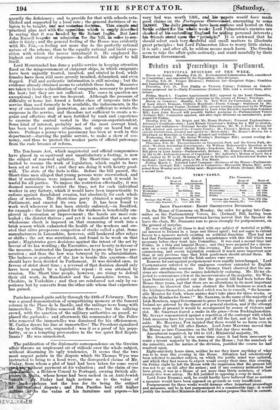The Ten-hours Act, which magisterial and official compromises have placed
in so equivocal and unsatisfactory a footing, is now the subject of renewed agitation. The Short-time agitators are incited to resume the work of legislation, which ought to have been set at rest in 1847; and they are doing it with hearty good- will. The state of the facts is this. Before the bill passed, the Short-time men alleged that young persons were overworked, and that if restrictions were imposed upon their work it would be useful for all parties. To impose the restriction effectually, it was deemed necessary to restrict the time, not for each individual worker in any factory, which it would have been impracticable to enforce against fraudulent evasion, but absolutely- for each whole class of workers. The Short-time party obtained a majority in Parliament, and enacted its own law. It has been found to work well wherever it has been strictly enforeed„—in Bradford, for example : the leisure gained for the workers is beneficially em- ployed in recreation or improvement ; the hands are more con- tented ; the district thrives • and yet it is manifest that a not un- wholesome check is imposed on that cramming of work into a brink season which exhausted the health of the workers and cre-
ated that ultra in congestion of stocks called a glut. Some rs manufacturen Lancashire, however, still hankered after relays or shifts ; the act was scrutinized, and found to be weak on that point ; Magistrates gave decisions against the intent of the act by favour of its lax wording ; the Executive, never hearty in favour of the measure, instructed the Inspectors not to press the law by pro- secution • and thus the law was betrayed by its administrators. The badness or goodness of the law is beside this question—that should have been decided in Parliament. It was decided once, in favour of strict short time • a reversal of that decision should only have been sought by a legislative repeal : it was attained by evasion. The Short time people, however, are rising to defend their old work, in Manchester and the Lancashire towns, in Cheshire, in Yorkshire • and they are reinforced not only by ex- perience but by convert; from the other side whom that experience has gained.
























 Previous page
Previous page